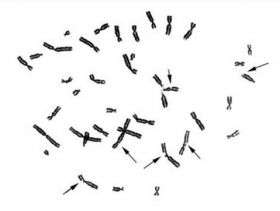Unravelling breast cancer susceptibility

(PhysOrg.com) -- Scientists at St Andrews University's Bute Medical School are investigating a vital link between radiation sensitivity and breast cancer susceptibility.
The study sheds new light on a vital enzyme that enables cells in our bodies to 'unravel' DNA. This enzyme allows the chromosomes to split into two prior to a cell dividing and could be linked to breast cancer susceptibility.
Using a model human cell system in which cells are grown in cultures in the laboratory, researchers have shown that when amounts of the enzyme 'topo-2' are reduced, the cells become resistant to low doses of gamma-rays and less damage to their chromosomes is observed.
Dr Peter Bryant of the Bute Medical School is heading the team. He said, "I believe that these findings could help explain individual susceptibility to sporadic (non-familial) breast cancer, since previous work in the Medical School has demonstrated an on-average higher radiation sensitivity of chromosomes to damage among white blood cells from breast cancer patients, when compared with groups of normal (non-cancer) patients."
Several studies by scientists in Manchester, Athens and Ghent have found a similar link between breast cancer and elevated chromosome radiation sensitivity, and while the underlying mechanism of the link is not yet understood, it is thought that changes in 'low-penetrance' genes could be involved in causing both the radiation sensitivity and breast cancer susceptibility.
The group in the Bute Medical School, including Professor Andrew Riches, PhD student Samantha Terry and technician Olga Shovman, in collaboration with Dr Dougal Adamson at Ninewells Hospital, is currently studying the levels of topo-2 and the effects of low-dose radiation on chromosomes of cells in culture in the laboratory and in white blood cells in samples taken from breast cancer cases.
Dr Bryant said, "The original aim of the laboratory cell culture work was to test a theory as to the way in which low-dose radiation causes damage to our chromosomes. Our published findings support the theory, and suggested a possible way in which this exciting result might help lead us in our ongoing study of patients, to understand more about breast cancer susceptibility."
The research is published in the latest edition of the British Journal of Cancer and is funded by the Breast Cancer Campaign and the Scottish Government.
Provided by St Andrews University



















